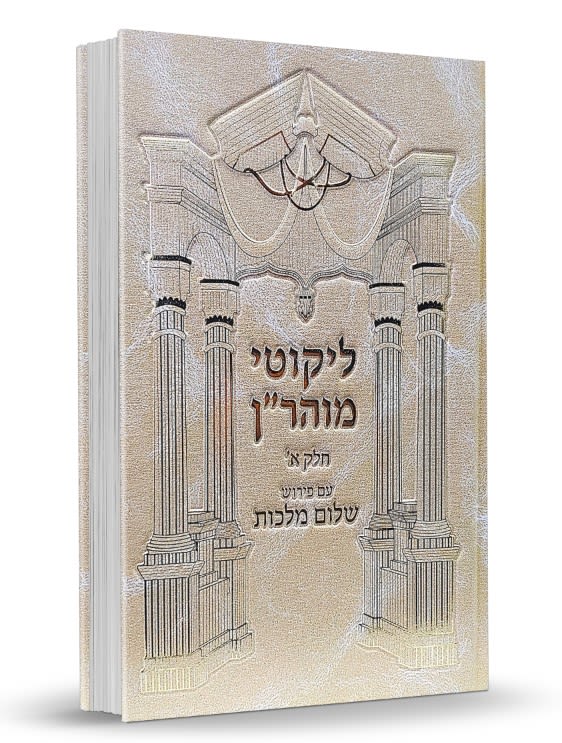
Va’etchanan: You Can’t Plead Everyone
What is the big deal about Moshe not being permitted to enter Eretz Yisrael? Being kept away indicates a broken relationship between the Jew and Hashem.

FRIDAY NIGHT:
:כה אֶעְבְּרָה־נָּ֗א וְאֶרְאֶה֙ אֶת־הָאָ֣רֶץ הַטּוֹבָ֔ה אֲשֶׁ֖ר בְּעֵ֣בֶר הַיַּרְדֵּ֑ן הָהָ֥ר הַטּ֛וֹב הַזֶּ֖ה וְהַלְּבָנֹֽן
I pleaded to G-d at that time saying . . . Let me now cross and see the good Land that is on the other side of the Jordan . . . (Devarim 3:25)
Imagine working so hard to free the enslaved Jewish nation from the clutches of Egyptian slavery, from the grip of the most powerful nation on the face of the earth at that time, and being successful. Then, imagine taking 3,000,000 people to Mt. Sinai, ascending into Heaven while remaining alive, and bringing down Torah for them.
And after all that, imagine surviving all their machinations to usurp power, rebel against G-d, and simply make trouble, only to make one tragic mistake. However, it is one mistake that was so tragic that all the pleading in the world could not change the decree, and therefore imagine being denied the main objective of setting out in the first place: to enter Eretz Yisroel! What a heart-breaker!
Yes, it was, as Moshe Rabbeinu conveys in this week’s parshah. However, was it really? For most of us, achieving our goals in life are so important because we have no clue of what is waiting for us on the other side of death. However, chances were that what was awaiting Moshe Rabbeinu was far greater than anything Eretz Yisroel could have offered him, and where he was headed, his view of the Holy Land was certainly going to be greater than from any mountain top he was going to ascend.
This is a question the Kli Yekar seems to have had, and he explains that what Moshe Rabbeinu really wanted to do was fulfill the mitzvot that are dependent upon the Land, such as tithing produce and observing the Shmittah year. These were things that Moshe could only have experienced by actually entering Eretz Yisroel, mitzvot that are no longer applicable once one passes the gates of Heaven, indeed even the borders of Eretz Yisroel (unless the produce is from there).
However, as we know from the Talmud, if someone wishes to perform a mitzvah and he is prevented from doing so beyond his control, then from Heaven’s point of view, it is as if the mitzvah was done (Brochot 6a). Although executing a mitzvah is crucial, what counts the most is how much we wish to perform them, and not always are the results in our control. In fact, they never are.
This is because what we wish to accomplish and what creation needs can sometimes be two different things. We may wish to perform a chesed for a person, but the object of our chesed may not merit that the chesed be done for him. Or, we may wish to daven (pray) in a minyan of ten men, make every effort to do so (including during a horrible snow storm, etc.), but for other reasons find ourselves, in the end, one person short.
Nevertheless, the Talmud is revealing, if we have done all WE could have done to complete the mitzvah, should our effort be ignored, especially since it is for effort that we are rewarded (Pirkei Avos 5:22)? Of course not, we did the mitzvah, as far as we are concerned.
Certainly, then, death is a circumstance beyond our control, and was even beyond Moshe’s control. Therefore, he could have assumed that his intense desire to perform the mitzvot dependent upon Eretz Yisroel were counted from Heaven’s point of view as if he had actually carried them out. If so, then the question returns, for what did Moshe Rabbeinu plead, and why?
* * *
SHABBAT DAY:
:ב שִׁמְע֚וּ שָׁמַ֙יִם֙ וְהַֽאֲזִ֣ינִי אֶ֔רֶץ כִּ֥י יְהֹוָ֖ה דִּבֵּ֑ר בָּנִים֙ גִּדַּ֣לְתִּי וְרוֹמַ֔מְתִּי וְהֵ֖ם פָּ֥שְׁעוּ בִֽי
:ג יָדַ֥ע שׁוֹר֙ קֹנֵ֔הוּ וַֽחֲמ֖וֹר אֵב֣וּס בְּעָלָ֑יו יִשְׂרָאֵל֙ לֹ֣א יָדַ֔ע עַמִּ֖י לֹ֥א הִתְבּוֹנָֽן
Children have I raised and exalted, but they have rebelled against Me. An ox knows his owner, and a donkey his master’s trough; but Israel does not know, My people does not comprehend. (Yeshayahu 1:2-3)
History is about either exile or redemption; there is no middle ground. There are transitional periods between the two when exile can have redemption-like qualities, or when redemption, coming to an end, can start to resemble exile more and more. However, transitions usually do not last that long, and they are not middle-ground between the two extremes.
However, if you define redemption as being physically-comfortable, then it is easy to be deluded into thinking that a middle-ground does exist. In those terms, exile can be quite redeeming for those who are materialistically well-off. That’s why the Three Weeks were instituted, culminating with Tisha B’Av, to remind us that being physically comfortable in exile has little to do with being spiritually comfortable in Eretz Yisroel living with a Temple, and the overt presence of the Shechinah.
This is one of the reasons why the rabbis made a point of connecting up Tisha B’Av with Rosh Hashanah, vis-a-vis the seven weeks of consolation that span the period of time between the two holidays. At first glance, the two holidays have little to do with each other, but in actuality, they have everything to do with each other.
The Talmud speaks of a time when drought ravaged Eretz Yisroel,and forced the great leaders of the time into the streets to pray for rain. Special fasts were instituted, and the additional blessings asking Heaven for rain were recited as per the tradition. However, still the rain did not fall, until Rebbe Akiva looked Heavenward and merely uttered the words, “Avinu Malkeinu” – Our Father, our King – at which point it poured.
It did not take long before these words made their way into all prayers to do with invoking Divine mercy. The question is, what difference did they make to unlocking the Gates of Heaven and transforming the judgment from one of strict justice to one of mercy? If you think about it, it is the same transformation we undergo each year as we move from Tisha B’Av to Rosh Hashanah.
In other words, one of the two holidays is represented by “Avinu,” whereas the other holiday is represented by “Malkeinu.” Now, since Rosh Hashanah is all about accepting G-d as King over the Jewish people, we have to assume that Rosh Hashanah is Malkeinu, and that Tisha B’Av is the Avinu, which may be a little difficult to accept, given that it is day of such phenomenal destruction against the Jewish people throughout history.
Ironically, the month of Av means exactly that. There is no such thing as a coincidence, but neither can we assume that the most obvious explanation is the most logical one as well. However, it is somewhat striking that, given all the potential names one could have called the fifth month of the Jewish year, its name became “Av,” which means “Father.”
This calls into question what it is we’re actually acknowledging on Tisha B’Av itself, and what the focus is meant to be. While it is hard not to recall and mourn all the destruction of the Jewish people over the millennia, believe it or not, that is really only supposed to be the means to a higher end.
The Talmud teaches:
Rava said, and some says Rav Chisda: If a person sees that suffering has come to him, then he should investigate his actions . . . If he investigates his actions and finds no wrong doing, then he should assume it is the result of wasting Torah learning time . . . But if he knows he has wasted no learning time, then he knows it is suffering from love. (Brochot 5a)
The Hebrew term is yesurim shel ahavah, which Rashi explains to define as follows:
The Holy One, Blessed is He, afflicts him in this world without the cause of sin in order to increase his reward in the World-to-Come beyond his personal merits. (Rashi, Brochot 5a, q.v. Yesurim Shel Ahavah)
Seems like an oxymoron, doesn’t it? Suffering is usually something we like to inflict on our enemies, not on our loved ones. And that is why Tisha B’Av, for so many, is a day to feel G-d’s disgust for the Jewish people, to feel the rejection of His children, and perhaps the reason why we are still in exile until this very day.
* * *
SEUDAH SHLISHIT:
:יב אַשְׁרֵ֚י הַגֶּ֣בֶר אֲשֶׁר־תְּיַסְּרֶ֣נּוּ יָּ֑הּ וּמִתּוֹרָֽתְךָ֥ תְלַמְּדֶֽנּוּ
Happy is the man whom G-d disciplines, and whom You teach from Your Torah. (Tehillim 94:12)
It was not that Dovid HaMelech enjoyed suffering. Quite the contrary, he enjoyed the perfect life. And thus he continued with an explanation of the previous words:
יג לְהַשְׁקִ֣יט ל֖וֹ מִ֣ימֵי רָ֑ע עַד־יִכָּרֶ֖ה לָֽרָשָׁ֣ע שָֽׁחַת
To give him rest from the days of evil, while a pit is dug for the wicked. (Tehillim 94:13)
It was that pit that scared Dovid HaMelech. He had been worried about his yetzer hara, and its delusional effects, something most of us just seem to take for granted as an aspect of everyday life. That was one of the main differences between Dovid HaMelech and the rest of us: no matter where he was going, he was going to the World-to-Come. The rest just know that, theoretically, it is some place that we’re all supposed to end up one day, way off in the distant future.
In a sense, it is like the athlete who wants to win a gold medal at the Olympics, and knows that his coach also wants him to win the gold medal. He doesn’t want to hear from the coach, “Hey, that was a great run you had. You are a great athlete,” unless it is really true, and only after he has won. Any athlete knows that, in order to perform the best one can at the crucial moment of truth, he has to be afraid of under-performing.
In fact, it is amazing how much abuse people will take to succeed in life, when they know the one doing the “abusing” has their best interest in mind. Or, at least, taking the abuse will allow them to accomplish their personal goal of success, even if the abuser does not have their success in mind.
However, in spite of what many will make of Jewish history, G-d never abuses anything or anyone. And, He always has a person’s best interest in mind, when his or her goal is a worthy one. Furthermore, He is even more committed to our success as a people than we have ever been, and that’s why Dovid HaMelech added:
:יד כִּ֚י | לֹֽא־יִטֹּ֣שׁ יְהֹוָ֣ה עַמּ֑וֹ וְ֜נַֽחֲלָת֗וֹ לֹ֣א יַֽעֲזֹֽב
For G-d will not cast off His people, nor will He forsake His heritage. (Ibid. 14)
Even after we have cast Him off, and forsaken our heritage.
Later, after history comes to a close and the yetzer hara is no more, all of our priorities will line themselves up perfectly, and we’ll only care about what mattered most to G-d. Then we will be able to see with perfect 20-20 hindsight how all that “bad” we underwent as individuals and as a people was just to keep us from disappearing into spiritual oblivion.
As the Talmud says, now we bless G-d for the bad just as we bless Him for the good. However, at that time, we will only bless Him for the good, because that’s all there really ever was: good.
That is because, principally, our relationship to G-d is a father-child one. It just happens to be that our father happens to also be the king, a bonus. However, first and foremost He is the Father in Heaven, and that is what Rebbe Akiva pointed out when he said, “Avinu Malkeinu,” and not “Malkeinu Avinu,” or just “Malkeinu.” That had been the reason for the drought, and that is the reason for all of our suffering, to realize that G-d is our Father, that He wants the best for us, and that He is constantly trying to inspire us to gain even larger portions in the World-to-Come.
That is the message of Tisha B’Av (the ninth of our Father); Rosh Hashanah reminds us that He is also our King.
* * *
MELAVE MALKAH:
:כג וְכִֽי־תָבֹ֣אוּ אֶל־הָאָ֗רֶץ וּנְטַעְתֶּם֙ כָּל־עֵ֣ץ מַֽאֲכָ֔ל וַֽעֲרַלְתֶּ֥ם עָרְלָת֖וֹ אֶת־פִּרְי֑וֹ שָׁל֣שׁ שָׁנִ֗ים יִֽהְיֶ֥ה לָכֶ֛ם עֲרֵלִ֖ים לֹ֥א יֵֽאָכֵֽל
When you come to the land you shall plant . . . (Vayikra 19:23)
That is all well and fine, but what does it have to do with Moshe’s intense desire to perform the mitzvot that are related only to Eretz Yisroel? The answer to this question emerges from three sources: Parashat Beshalach, Parashat Ki Teitzei, and Rashi.
In Parashat Beshalach, the Jewish people first meet, or rather, confront the nation that is to be their antithesis until Mashiach comes, Amalek. In Parashat Ki Teitzei, we are told exactly what he did to us:
:יז זָכ֕וֹר אֵ֛ת אֲשֶׁר־עָשָׂ֥ה לְךָ֖ עֲמָלֵ֑ק בַּדֶּ֖רֶךְ בְּצֵֽאתְכֶ֥ם מִמִּצְרָֽיִם
:יח אֲשֶׁ֨ר קָֽרְךָ֜ בַּדֶּ֗רֶךְ וַיְזַנֵּ֤ב בְּךָ֙ כָּל־הַנֶּֽחֱשָׁלִ֣ים אַֽחֲרֶ֔יךָ וְאַתָּ֖ה עָיֵ֣ף וְיָגֵ֑עַ וְלֹ֥א יָרֵ֖א אֱלֹהִֽים
Remember that which Amalek did to you on your way when you left Egypt, encountering you along the way and attacking the weak who straggled after you, while you were tired. He came after you and did not fear G-d. (Devarim 25:17-18)
The Midrash explains that Amalek’s main intention in attacking the Jewish people was to “cool” them down spiritually, and make them doubt Divine Providence and the existence of the World to Come, as Rashi indicates:
ENCOUNTERING YOU ALONG THE WAY: Yet another explanation is that it is language of “kur v’chum” (cold and heat), as if to say that he made you cold and lukewarm after you had been boiling. For, all the nations were afraid to war against you and this one came and led the way for others. It is like a boiling hot bath into which no living being could enter, until a wild person came and jumped into it. Although he scalded himself he made it cooler for others. (Rashi, Devarim 25:18)
However, the Rashi that makes the most difference to this discussion is the one back in Parashat Beshalach, which explains what opened the door for Amalek to attack in the first place:
:ח וַיָּבֹ֖א עֲמָלֵ֑ק וַיִּלָּ֥חֶם עִם־יִשְׂרָאֵ֖ל בִּרְפִידִֽם
Amalek came and went to war with Israel in Refidim. (Shemot 17:8)
AND AMALEK CAME: The Torah juxtaposes this section and the previous verse in order to convey: “I (G-d) am always amongst you and ready to fulfill your needs, and yet you say, ‘Is G-d among us or not?’ (I swear) by your lives that the dog (Amalek) will come and bite you and you will cry out to Me and then you will know where I am.” This is comparable to a man who placed his son on his shoulders and went on a journey. Whenever the son saw a desirable object, he would say, “Father, take that object and give it to me,” and he would give it to him. This happened a second and a third time. Eventually, they met a certain person whereupon the son said to him, “Have you seen my father?” His father said to him, “Do you not know where I am?!” Whereupon he threw him off himself and the dog came and bit him.” (Rashi, Shemot 17:8)
Notice the analogy Rashi chose to illuminate his point? Was it incidental that Rashi chose a parable of a father and son, or was he being specific? He, was, of course, being specific, because he wanted to teach that it is THIS particular aspect of the relationship between G-d and the Jewish people that Amalek attacks, and attacks, and attacks. And, as a result, the one in which we doubt the most, and doubt, and doubt.
And, what is the battleground on which Amalek wages his war against this relationship? Revealed the Vilna Gaon:
The following are the circumstances and manners of Redemption . . . Eradicating the impure spirit from Eretz Yisroel by planting in the Holy Land. The three groups of exiles depend on this, according to the Gaon, especially the commandments concerning leaving the poor man the gleanings of the crop, the forgotten sheaf, and the corners of the field. How much should be planted and to what extent? The land should be planted until it is no longer desolate, until the holy land bears its fruit. The goal is to drive out the spirit of impurity from the land, to purify the holiness of the “Revealed God” from its klipah (peel, shell), etc. The holiness of the Revealed God rests upon the fruits of the Holy Land. This is the sod of the reason for the mitzvah, “When you come to the land you shall plant . . .” (Vayikra 19:23). According to the Midrash, you should not occupy yourself with anything except planting, and this was the main part of the mission of the Vilna Gaon . . . The war against Amalek is in every generation. The war against Amalek is against three types of foes: a) Amalek of the heart, that is, the evil inclination and vices; b) the spirit of Amalek, the general one, the Satan who destroys – the adversary of Israel. This is Sama’el and his hosts. His main power is in the gates of Jerusalem, when its lands are desolate; c) the material Amalek, that comprises Eisav and Yishmael, and the Erev Rav (Mixed Multitude). As explained by the Gaon: we are commanded to inherit it [the Land, if need be] by force. The strength and leadership of Amalek’s spirit is in the gates of Jerusalem, as mentioned above, but only when there is destruction and desolation near the gates, and in the un-walled areas of Jerusalem. As long as the spirit of impurity rules there, the feet of the cypress tree cannot stand there. This delays the connection between the Jerusalem of below and the Jerusalem of above, that is the connection between the Shechinah and “Knesset Yisroel” on which the entire Redemption depends. The war against the desolation is waged not only by setting up tents of Ya’akov and dwelling places of Israel in their respective places, but also by planting its land and fulfilling the commandments dependent on it. The war against the material Amalek always depends on the time and place, and necessitates counterattacking (lit., “returning the battle to the gate”) with force, as in the days of Ezra and Nehemiah, and like the conquest during the days of Yehoshua. (Kol HaTor, Chapter 7)
This is why, the Gaon taught, Parashat Ki Tavo follows Parashat Ki Teitzei, and the recounting of Amalek’s attack. For, nothing represents a broken relationship more than being sent away from home, and being kept away from home. And, even if one is allowed to return there, but is not allowed to live securely there or to prosper at home, this too indicates a break in the parent-child relationship.
Therefore, it had been Moshe Rabbeinu‘s fervent desire and plan to end the exile once and for all, and to destroy Amalek and doubt in our Father-in-Heaven. This meant, he understood, crossing the Jordan River, conquering the land, and making it prosper. This was something he could only do while alive, and thus he pleaded with G-d, for our sake, and not for his, to be able to fulfill the mitzvot that can only be done in Eretz Yisroel.
***
Pinchas Winston is the author of over 95 books on various topics that deal with current issues from a traditional Jewish perspective. He has also written on the weekly Torah reading since 1993, called “Perceptions”, as well as on current topics and trends affecting Jewish history, past and present. One of his missions is to make the depth and beauty of the more mystical teachings of Torah understandable and accessible to those who can really benefit from them. Visit his website at thirtysix.org.











Tell us what you think!
Thank you for your comment!
It will be published after approval by the Editor.